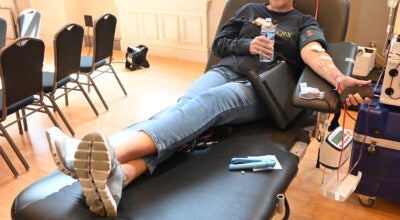Judgment continued becomes guilty for Vanderford
Published 12:00 am Wednesday, December 2, 2009
By Shavonne Potts
spotts@salisburypost.com
A Rowan County judge found Alstin Vanderford guilty of ethnic intimidation Tuesday, nearly five years after he was originally charged.
Vanderford received 24 hours of community service, added to his August sentence for misdemeanor death by motor vehicle and felony leaving the scene of an accident by a passenger in an incident involving five other young people.
Vanderford received a prayer for judgment continued for ethnic intimidation in 2004 after he and three other teens, all white, went through a Wendy’s drive-through and poured water on a clerk, who was black, and uttered racial slurs. Ethnic intimidation is a misdemeanor charge.
He and two others were convicted this August on charges that stem from the 2006 death of Michael Jason Brown. The other three have not appeared in court yet.
Vanderford pleaded guilty in August to misdemeanor death by motor vehicle and felony leaving the scene of an accident by a passenger.
In a Tuesday hearing, the Rowan District Attorney’s office asked that the ethnic intimidation prayer for judgment continued be reviewed and a conviction granted.
Vanderford, 21, along with Brandon Heathcliff Lowery, 23, and Eric Gregory Taylor, 21, appeared in Superior Court in August and accepted terms of a plea agreement.
Three others: Patsy Elizabeth Morgan, 21, Rachel Ann Miller, 21, and Derek Ryan Talbert, 23, each face a misdemeanor charge.
In 2006, Brown was riding a scooter on U.S. 52 when he collided with a sport utility vehicle driven by Taylor.
During the August hearing, District Attorney Bill Kenerly said there was not enough evidence to determine that the SUV struck Brown.
Deferred
N.C. law considers a prayer for judgment continued, often referred to as a PJC, a deferred prosecution.
However, it has proven to be unclear whether a prayer for judgment is equivalent to a conviction.
What is clear is that if a person receives a prayer for judgment continued ó and if within a certain time period the accused repeats the crime or a similar one ó he or she will face both charges.
Tuesday’s hearing raised questions of how to handle this case since there have not been previous cases that match it.
Vanderford’s attorney, James Davis, cited examples that in some ways were similar to this case.
For example, there have been cases where a person received a prayer for judgment continued and the courts revisited the matter within 60 days, for a conviction.
In Vanderford’s case, it’s been nearly five years, and his current conviction is for a crime unrelated to ethnic intimidation.
Davis argued that an activated sentence would be unfair because his client completed the conditions the court established in 2004, which included a written and oral apology to the victim, 48 hours of community service and paying portions of the victim’s college tuition.
Assistant District Attorney Thomas King said that if this was not a prayer for judgment continued, then the defendant certainly “reaped the benefits of a prayer for judgment continued.”
He said defense attorneys want prayer for judgment continued for their clients in matters until the person comes back with a conviction.
District Court Judge Charlie Brown, who presided over Vanderford’s 2004 trial, said this case could affect other cases involving prayer for judgment.
“I do believe there are some policy ramifications because of the tool of prayer for judgment continued used in courthouses around the state,” Brown said.
King and Davis conferred for a few minutes about their options.
Davis returned to say Vanderford would consent to the motion, thus accepting a guilty conviction for ethnic intimidation.
No jail time
No active sentence was invoked. A 45-day stay in jail was suspended to 24 months of supervised probation. He must also pay any court costs. He was given credit for already doing so.
Most of the terms the judge invoked were the same terms Vanderford first received in 2004, such as not using alcohol or drugs and submitting to random drug screenings.
Vanderford is already on six months of electronic house arrest followed by six months of intensive probation for the August conviction.
He is also to remain enrolled in college or maintain gainful employment.
Vanderford told the judge he is in his second year at Rowan-Cabarrus Community College with plans to transfer elsewhere.


